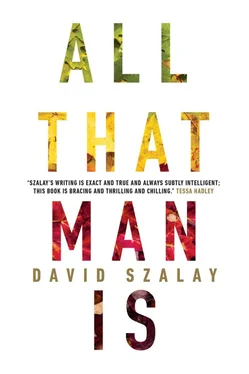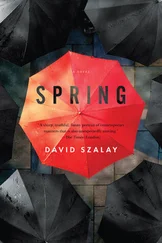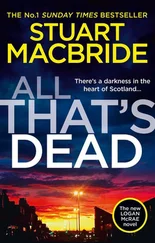He only spent half an hour looking at the abbey — a series of low brick buildings, very plain, with small windows. A few modest pieces of carved white marble. Inside, it was mostly just empty rooms. There was a courtyard with a square of lawn and a well in the middle. It was all quite evocative. A memorial to a way of life that went on here for a thousand years, a way of seeing the world. One side of the courtyard was formed by the side wall of the abbey church. The whole interior of the church was painted with scenes and figures. He spent some time in there, looking with a historian’s interest at the painted walls, the strange and often violent scenes depicted on them. A man on fire. Naked women. A sort of devil, with suffering people in his enormous oval mouth.
When he had had enough, he stepped out into the porch. The low winter sun shone into the deep porch. Set in its walls were some marble tablets, memorials for the important dead. In a tranquil and unhurried mood, he studied some of these. They were in Latin, obviously, a language he learned a lifetime ago. He is still able, sometimes, to make something of it, and in one of the inscriptions he found five words that made him stand there thoughtfully for a while. A single Latin sentence, on a piece of stone in memory of a man who had died hundreds of years ago.
The waiter puts the hot soup on the table in front of him, and some bread sticks individually wrapped in paper.
‘ Grazie ,’ he says.
‘ Prego ,’ the waiter says, as he walks away.
The Germans at the other table have unfolded a map of northeastern Italy. Poring over it, they talk to each other in quiet voices.
The waiter is talking to someone too, though nobody is visible. He speaks again, in a scolding tone. And then a little girl emerges from somewhere and walks over to one of the empty tables where she sits down. She must be…Seven years old? She sits at the table, looking out the window, her feet swinging well short of the floor.
Tony eats his soup — minestra di fagioli . Green leaves of cabbage float in it, huge creamy beans.
Unselfconsciously, and still staring at the window, at the empty stillness of the winter day, the little girl has started to sing something in a soft, lisping voice.
While he eats his soup, he tries to understand the words of the song. She is singing it for a second time now.
‘ Gennaio nevicato ,’ she sings, her lips hardly moving.
In January it snows.
‘ Febbraio, mascherato .’
February is masked.
‘ Marzo, pazzerello .’
March is mad, madness.
‘ Aprile, ancor più bello .’
April, even more lovely.
‘ Maggio, frutti e fiori. Giugno, vado al mare .’
May, fruits and flowers. June, off to the sea.
‘ Luglio e Agosto, la scuola non conosco .’
July and August, school is unknown…No school.
‘ Settembre, la vendemmia. Ottobre, con la nebbia .’
September, the, er…harvest. October, foggy.
‘ Novembre, un golf in piú. Dicembre con Gesù .’
November, an extra jumper. December, Jesus.
Having finished the song, she wipes her nose with the back of her hand. She has auburn hair, pale skin. She sees that he is looking at her. Her eyes are greenish.
He smiles. ‘That was a nice song,’ he says to her, in Italian.
She says, ‘I learned it at school.’
‘Did you?’
‘Yes.’
‘Well…’ He is not sure what to say. ‘Well done,’ he says.
She shrugs and starts to sing it again, evidently with nothing else to do, staring out the window.
‘ Gennaio nevicato. Febbraio, mascherato …’
The Germans are paying for their meal.
They leave and the waiter starts to tidy their table.
‘ Un caffè ,’ Tony says to him as the man passes with an armful of plates. He acknowledges the order with a single nod. His daughter — if she is his daughter — is still singing.
Novembre, un golf in più. Dicembre con Gesù .
And the Germans are unexpectedly there again. They hurry in, obviously agitated.
The waiter is at the espresso machine, whacking something.
‘ Polizei! ’ the German man almost shouts. ‘ Polizei! ’
The waiter doesn’t stop what he is doing. He just turns his head, and the German says something in his own language which the waiter does not seem to understand.
The man tries English. ‘Please, you must call the police,’ he says.
‘You must call the police,’ echoes his wild-eyed wife.
In Italian, the waiter says, ‘The police? Why?’
‘You must call them,’ the man says, still speaking English. ‘Our car…Somebody has.’ And he motions with his fist.
‘Somebody has broken into your car?’ the waiter says, sticking to Italian himself, and sounding wearily unsurprised.
‘Yes, yes,’ the man says in English, understanding. ‘You must call the police.’
‘Okay,’ the waiter says, unexcitably. ‘I’ll call the police.’
First, though, he takes Tony his espresso — something Tony appreciates, though it evidently exasperates the Germans, particularly the woman, who turns to the door with an outraged sigh. The waiter returns unhurriedly to the bar and picks up the phone, which is attached to the wall next to a calendar with pictures of agricultural machinery.
It suddenly occurs to Tony that his own car might be in danger. He says to the Germans, who are waiting nervously, ‘Do you mind my asking where you’re parked?’
The man stares at him as if he hasn’t understood. However, he then says, motioning, ‘Over there, next to the small lake.’
‘Oh,’ Tony says. ‘I’m parked there as well.’
The man just shrugs, as if he has more important things to worry about than where other people are parked, and turns to the waiter, who is still on the phone saying something about ‘another one’.
When the waiter has finished, Tony is standing there with a ten-euro note in his hand.
Fearing the worst, he leaves and starts to walk towards the small lake and the parking spaces, the insistent smell of dog shit. That sign, warning of thieves — shouldn’t have ignored it. The Passat is in view now and he quickens his pace. It looks okay. Yes, it is okay. In one of the other spaces an Opel estate with German plates has had a window smashed. Poor Germans. Probably on holiday, and now this to deal with. As he tries to find his way back to the main road, he passes the arriving police. Maybe he should have stayed and translated for them, the Germans — they didn’t seem to know Italian, and they’ll be lucky if the police speak English. Not much English spoken out here. Even the tourists in summer are mostly Italian. Well. They’ll sort it out. He is already at the junction with Strada Statale 309. He needs to turn left — he needs both lanes to be clear. He sits there with the indicator ticking, traffic coming from both directions. The sun, already starting to sink, is in his eyes and he lowers the visor. Distant trees melt into the cold yellowish glow of the horizon. Still the traffic comes. His index fingers tap the black plastic of the steering wheel. This is silly now. He stifles a yawn. There is a truck coming from the left. Nothing, finally, from the other side. It is quite far off, the truck. Surely it is far enough for him to pull out across it. Not if he waits. So don’t wait. Do it. Now.
Amemus eterna et non peritura .
Amemus — Let us love. Eterna — that which is eternal. Et non peritura — and not that which is transient.
Let us love what is eternal and not what is transient.
Читать дальше












